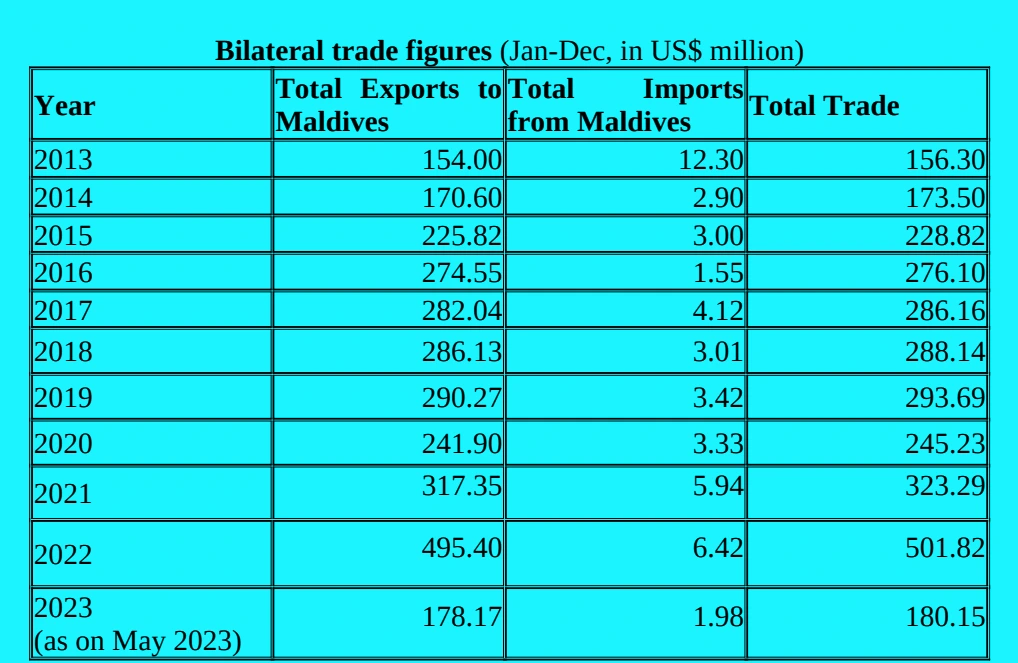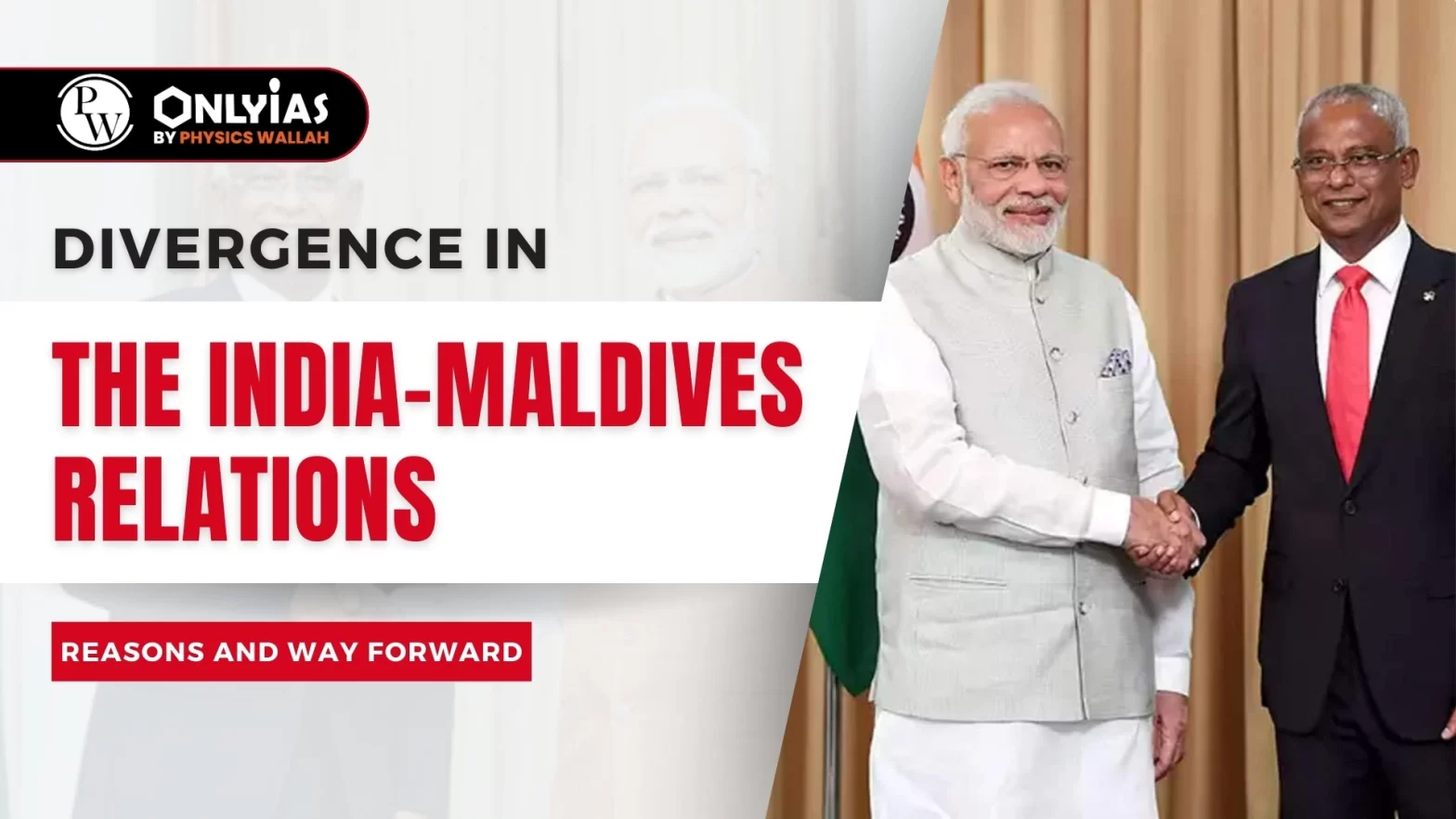Context: The Maldives government has recently suspended three of its ministers for their derogatory remarks on India’s Prime Minister.
India-Maldives Relations and Recent Social Media Controversy
- PM’s Lakshadweep Visit: Recently, the Indian Prime Minister (PM) visited Lakshadweep to inaugurate the Kochi-Lakshadweep Islands Submarine Optical Fiber Connection and some other projects.
Lakshadweep’s Tourism Potential:
- Location: Lying about 400 km off the coast of Kerala in the Arabian Sea, the picturesque islands have long been seen as a “hidden gem” for Indian tourists.
- Infrastructure Push: The Union government is enhancing infrastructure along the western coast. As the coastal tourism continues to rise, the nation eagerly anticipates the transformation of Lakshadweep into a prime tourist destination.
- PM’s Visit: PM shared picturesque images of Lakshadweep, highlighting the islands’ stunning beauty, expressing optimism about the region’s tourism potential.
- Rising Coastal Tourism in India: In a recent report by Organisation for Economic Cooperation and Development (OECD), coastal tourism in India is experiencing a significant rise, marked to become one of the leading sectors within the nation’s growing ocean economy.
|
-
- The PM’s recent social media posts promoting tourism in Lakshadweep have ignited an unexpected controversy, triggering a social media war involving Maldivian officials, politicians, and Indian social media users.
- Offensive Comments: Maldivian officials responded with offensive comments against India which escalated the situation.
- Social Media Backlash: The social media war led to a #VisitMaldives campaign by Maldivian officials, in response, Indian social media users, Bollywood celebrities and Indian sportspersons initiated a ‘#Visit Lakshadweep’ campaign.
- Maldives Government’s Response: While some Maldivian politicians condemned the comments, the Maldives Ministry of Foreign Affairs stated that personal opinions on social media do not represent the government’s views.
Background of India-Maldives Relations
- Historical Links in India-Maldives Relations: India and Maldives share ethnic, linguistic, cultural, religious and commercial links rooted in antiquity and enjoy close, cordial, and multi-dimensional relations.
- Recognition and Diplomatic Relations: India was among the first to recognize Maldives after its independence in 1965 and to establish diplomatic relations with the country.
- High Commission: India established its mission in 1972 and resident High Commissioner in 1980. Maldives opened a full-fledged High Commission in New Delhi in November 2004.
India-Maldives Relations: Importance of India for the Maldives
- Ensuring Defence and Security: India remains a valuable regional security partner, making up for Male’s scarce maritime surveillance capacity and capabilities.
- For instance, even during the Presidency of Abdullah Yameen (2013-2018), under whose Presidency Male drifted closer to China, Maldives continued defense cooperation with India.
- According to the Ministry of External Affairs (MEA), India provides around 70 percent of defence training requirements of the Maldivian National Defence Force (MNDF). Capacity building through joint exercises like the Ekuverin, Ekatha, and disaster management have also been part of defense cooperation.
- India-Maldives Bilateral Trade: India is also the Maldives’ biggest trade partner, a top export destination, and a traditional donor.
 Maldives is dependent on India for a host of essential commodities like rice, wheat flour, sugar, potatoes and onions, eggs, vegetables and even construction material.
Maldives is dependent on India for a host of essential commodities like rice, wheat flour, sugar, potatoes and onions, eggs, vegetables and even construction material. - The State Bank of India is the largest bank in the island nation and has been playing a key role since 1974 by providing loans for resorts, the export of marine products and business enterprises.
- Development And Infrastructure: India is engaged in a host of infrastructure and development projects in the Maldives, ranging from airports at Hanimaadhoo and Gan Island, the Greater Male Connectivity Project, as well as the development of Gulhifalhu Port.
- The biggest project India is presently carrying out in the Maldives is the Greater Male Connectivity Project, for which, India has sanctioned USD 500 million.
- Healthcare And Education:
- In the healthcare sector, India has provided Rs 52 crore for the development of Indira Gandhi Memorial Hospital besides helping set up a state-of-art cancer facility that will connect over 150 health centers on various islands.
- In education, India helped set up an institute of technical education in 1996. India has also started a program to provide training to Maldivian teachers and youth and for vocational training in a USD 5.3 million project.
- Maldives Tourism: India is amongst the largest sources of visitors to the Maldives, which is heavily dependent on tourism to run its economy.
- As per the World Bank, tourism revenue accounts for almost one-third of its economy.
- According to the Maldives tourism ministry statistics, more than 2.09 lakh Indians visited the island nation in 2023. Since 2018, Indians have been the largest source of tourist arrivals.
India-Maldives Relations: Importance of Maldives for India
- Strategic Importance: Maldives is an important partner for India, as it is strategically located with respect to key international shipping lanes in the Indian Ocean which ensure uninterrupted energy supplies to countries like India, China, and Japan.
- Maldives is geographically positioned like a ‘toll gate’ between the western Indian Ocean chokepoints of the Gulf of Aden and the Strait of Hormuz on the one hand, and the eastern Indian Ocean chokepoint of the Strait of Malacca on the other.
- India’s Role as Net Security Provider: As the pre-eminent South Asian power and a ‘net security provider’ in the Indian Ocean region, India needs to cooperate with Maldives in security and defense sectors.
- Cooperation in Regional Groupings: Maldives is also a member of South Asian Association for Regional Cooperation (SAARC) and it is important for India to have Maldives on board to maintain its leadership in the region.
- For instance, Maldives was reluctant to follow India’s call for boycott of the SAARC summit in Pakistan after the Uri attack.
- Ensuring Safety and Security of Indian Diaspora: Indian expatriate community in the Maldives has an approximate strength of 27,000 living peacefully with Maldivians and other expatriates, with no major issues being faced by them.
Reasons for Increasing Divergence in the India-Maldives Relations
- Changing “India First” Approach: In Maldives, people are divided into two viewpoints. One is supporting the ‘India out’ campaign and the other is the ‘India first’ campaign led by former president Ibrahim Mohamed Solih.
- For instance, the new President of Maldives Mohamed Muizzu visited Turkey as his first destination for a bilateral visit, followed by China, breaking a long-held tradition whereby his predecessors used to visit India first after taking office.
Hydrography Pact:
- Signing of Hydrography Pact: The Prime Minister of India traveled to the Maldives for a State Visit in 2019, and various MoUs were signed during the visit, including one for Cooperation in the Field of Hydrography between the Indian Navy and the Maldives National Defence Force (MNDF).
- Hydrographic Surveys: They help to map out water depth, the shape of the seafloor and coastline, the location of possible obstructions, and physical features of water bodies to ensure the efficiency and safety of maritime transportation.
|
- Effects of Domestic Politics of Maldives: Relations between the Maldives and India have been on shaky grounds since President Muizzu came to power and there have been deliberate attempts by Male to create a distance with New Delhi.
- For instance, the termination of the hydrography pact by Maldives can be seen as a way of distancing from India.
- Diplomatic Crisis in Maldives: All states in South Asia and the Indian Ocean Region (IOR) have to balance between their two regional powers viz. India and China. It requires a fine diplomatic balance. In the case of the Maldives under Muizzu, that balance has become faulty.
- For instance, the Maldivian envoy to India was summoned by the external affairs ministry amid the row over Maldives leaders’ derogatory comments on India’s PM.
- This imbalance is further leading to a situation where not only ties between the two governments but also between the two peoples are likely to be impacted by long-term consequences.
- Rising Chinese Influence: President Muizzu’s decision to visit China before India has raised concerns, with rising speculations about the Maldivian leader’s pursuit of an “India-out” policy and leaning toward China.
- China in pursuit of its own geo-economic goals, views Maldives as one of the key components of its ‘Belt and Road’ Initiative (BRI) and is actively establishing its presence by involving itself in infrastructure projects in the archipelago.
- Islamic Radicalisation Concerns for India: Over the past decade, the number of Maldivians drawn towards Islamic State (IS) and Pakistan-based jihadist groups like Lashkar-e-Toiba (LeT) have exploited Maldives through its charitable front organization, Idara Khidmat-e-Khalq, to establish a foothold in the garb of relief operations post-2004 tsunami.
- For instance, the Islamic radicals attacked a Yoga gathering organized by the Indian embassy in 2022, saying Yoga did not align with their Islamic beliefs.
- Perceived Security Challenges: The present government of Maldives has accused India of violating the country’s sovereignty, and asked India to remove its troops from Maldives as part of the ‘India out’ campaign.
- Further, Male was absent from the Colombo Security Conclave meeting in December 2023.
Also Read: Indian Ocean Rim Association (IORA)
Way Forward to the India-Maldives Relations
- For Maldives: India remains a critical economic and security anchor in the region which makes it imperative that mutual sensitivities are respected.
- To further strengthen the ties the new government has to let go of an anti-India stance by lowering China’s growing influence in South- Asia.
- For India: Indian diplomacy could be flexible enough to engage multiple actors in the neighboring countries, including Maldives. This would help in engaging with whoever is in power rather than engaging only those in power.
- he trending hashtag “boycott Maldives” is self-defeating as China is well-positioned in Maldives to take advantage from this situation.
- Further, boycotting Maldives in any form will only reduce India’s leverage in the islands. Thus, India should ensure a firm but patient engagement with Maldives.
Conclusion
The ongoing dispute underscores the importance of diplomatic communication in the digital age and the need for responsible engagement between nations.
![]() 9 Jan 2024
9 Jan 2024

 Maldives is dependent on India for a host of essential commodities like rice, wheat flour, sugar, potatoes and onions, eggs, vegetables and even construction material.
Maldives is dependent on India for a host of essential commodities like rice, wheat flour, sugar, potatoes and onions, eggs, vegetables and even construction material.